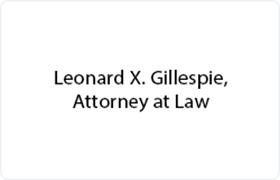New York White Collar Crime Lawyer, New York
Sponsored Law Firm
-
 x
x

Click For More Info:
-
Leonard X. Gillespie, Attorney at Law
16 Court Street Suite 2504 Brooklyn, NY 11241» view mapDivorce & Family Law We Care About Making A Difference
We are socially conscious, proud to be American and believe that race matters. We care. We want to make a difference.
800-769-4420
Robert Michael Appleton
✓ VERIFIEDInternational, Criminal, Government, White Collar Crime, RICO Act
Robert M. Appleton is a world renowned and internationally recognized cross border litigation attorney focused on assisting global, foreign and US co... (more)
Nicholas Gregory Kaizer
✓ VERIFIEDFelony, Federal, White Collar Crime
Nicholas Kaizer is a nationally -recognized expert in criminal defense, who has appeared in numerous courts around the country. He has lectured attorn... (more)
Alfredo F Mendez
Mental Health, White Collar Crime, Criminal, Business Organization
Status: In Good Standing
FREE CONSULTATION
CONTACTFarva Jafri
Bankruptcy & Debt, Tax, Divorce, Estate Planning, White Collar Crime
Status: In Good Standing
FREE CONSULTATION
CONTACTFREE CONSULTATION
CONTACT Leonard X. Gillespie Brooklyn, NY
Leonard X. Gillespie Brooklyn, NY Practice AreasExpertise
Practice AreasExpertise


